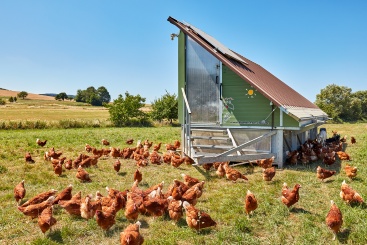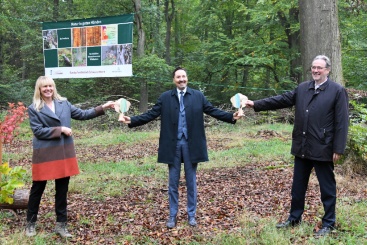Socially responsible behavior Sustainability is a recurrent theme across our promotional mandate
As land is an essential resource which cannot be regenerated, a long-term orientation over generations has always been of particularly high priority within agriculture and forestry. The term ‘sustainability’, in the sense of the perpetual use of a natural resource, was originally coined within German forestry by Hans Carl von Carlowitz.
The agricultural and forestry sectors offer a variety of approaches to achieving sustainability goals. Here the production of renewable energy and the reduction of direct emissions, such as methane from animal husbandry for instance, make a major contribution to climate protection. The preservation and promotion of biodiversity in areas used for agricultural and silvicultural purposes also combine aspects of both ecological and economic sustainability in equal measure.
For Rentenbank, socially responsible behavior and the protection of the environment are of particularly high priority. Our promotional activities are geared toward the long term. In addition, essential aspects of sustainable farming were explicitly incorporated in the bank’s governing law in 2002.
In our guiding principles, we also subscribe to our responsibility for the sustainable improvement of economic, ecological and social aspects. This comprises not only the guiding ideas behind our promotional policy but also the way we behave within our organization.
Sustainability in our core business
Six examples from our promotional activitiesHow does Rentenbank promote sustainability?
Sustainability has always been one of our core business activities. In addition, key aspects of ecological sustainability have also been explicitly enshrined in our statutory promotional mandate in 2002. In 2018, we gave financial support to sustainable initiatives to the tune of a total of EUR 1.8 billion, including the promotion of renewable energy. As part of the ‘Sustainability’ and the ‘Environmental and consumer protection’ programmes, we support a broad range of initiatives to improve animal welfare, energy efficiency and to reduce emissions. The direct and regional marketing of agricultural products, the ecological farming and humane animal husbandry also come under these programmes. An additional priority is the promotion of renewable energy as part of our promotional programme called ‘Energy from the countryside’. Here, the focus of investments is on the production, storage and distribution of renewable energy. In this programme, we also promote community wind farms, which are each owned by a majority of local citizens, companies and property owners. The following sustainable investments reflect this variety.
About the specific projectsSpecial nature conservation projects
Award for sustainable forest management at Buchenborn ForestUN Decade on Biodiversity
In addition to our sustainable promotional projects within special promotional loans business, which we run in collaboration with the local banks, we also initiate projects ourselves to contribute to sustainability and maintain close ties with agriculture and rural areas. An example to illustrate this is a habitat development geared toward natural processes in forested and open areas. To this effect, Rentenbank and the Institute for Federal Real Estate Bundesanstalt für Immobilienaufgaben (BImA) have concluded a framework agreement on the long-term ecological cultivation of 550 hectares of forest in the region of Wetterau in Hesse.
The BImA manages the forest and provides expert advice for developing projects within the initiatives. They cultivate the areas in accordance with strict ecological principles revolving around the retention, rather than removal, of old and dead wood to decompose naturally, the complete abstention from biocides and a commensurate population of game.
BImA organizes additional projects within this framework agreement which contribute to nature conservation. This project was commended on 13 October 2020 as a “UN Decade Project".
About the specific projectsAward for red deer grazing to maintain open landscapesUN Decade on Biodiversity
It is a considerable challenge reconciling biodiversity with military use. Grafenwöhr military training base north-east of Nuremberg is part of one of the most valuable areas of land within the European network of nature protection areas known as NATURA 2000. This area plays host to numerous plant and animal species that are endangered or threatened with extinction - some of these habitats are deemed important at a pan-European level.
Therefore, Grafenwöhr federal forestry agency and its partners have broken new ground by corralling the red deer into clearings and limiting hunting at the base to a few days every year. The funding for a study which monitored the project over a five-year period comes from the Federal Republic’s Special Purpose Fund which is funded and administered by Rentenbank. The results prove that ecologically valuable open landscapes can be maintained if red deer can graze there. At the same time, the deer are blazing a trail for numerous protected and endangered species. The project was awarded the title ‘United Nations Decade on Biodiversity’ on October 19, 2019.
To the project websiteWorking together for more variety in the agricultural landscapeF.R.A.N.Z. Project
Wild flower strips at the edge of fields are not only pleasing to the eye but also to the natural world. They contribute to biodiversity on intensively farmed areas and are therefore one of many measures currently being developed and tested by the nationwide F.R.A.N.Z. Project (Future Resources, Agriculture & Nature Conservation/Für Ressourcen, Agrarwirtschaft und Naturschutz mit Zukunft). The aim of the project is to maintain and increase biodiversity in farmed regions. Since 2017, intensive ecological and socioeconomic research has been taking place at ten representative farms. The project which Rentenbank jointly funds is under the auspices of the Federal Ministry of Food and Agriculture (Bundesministerium für Ernährung und Landwirtschaft, BMEL) and the Federal Ministry of the Environment, Nature Conservation and Nuclear Safety (Bundesministerium für Umwelt, Naturschutz und nukleare Sicherheit, BMU) The joint project is run by the Michael Otto Foundation for Environmental Protection in conjunction with the German Farmers’ Association (Deutscher Bauernverband, DBV). The three federal Thünen Institutes for rural areas, for biodiversity and for business administration as well as the University of Göttingen assess the project from a scholarly point of view.
The previous research results from the project and further information can be accessed from the project website.
To the FRANZ website







